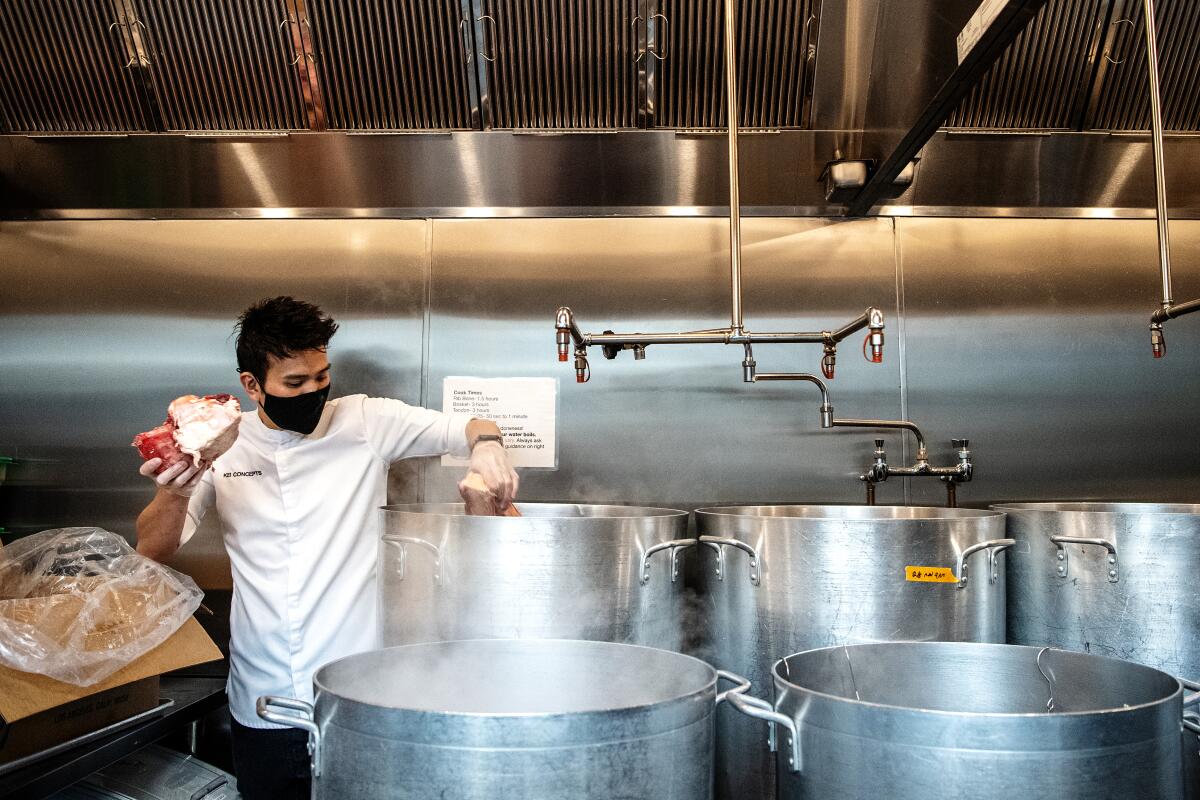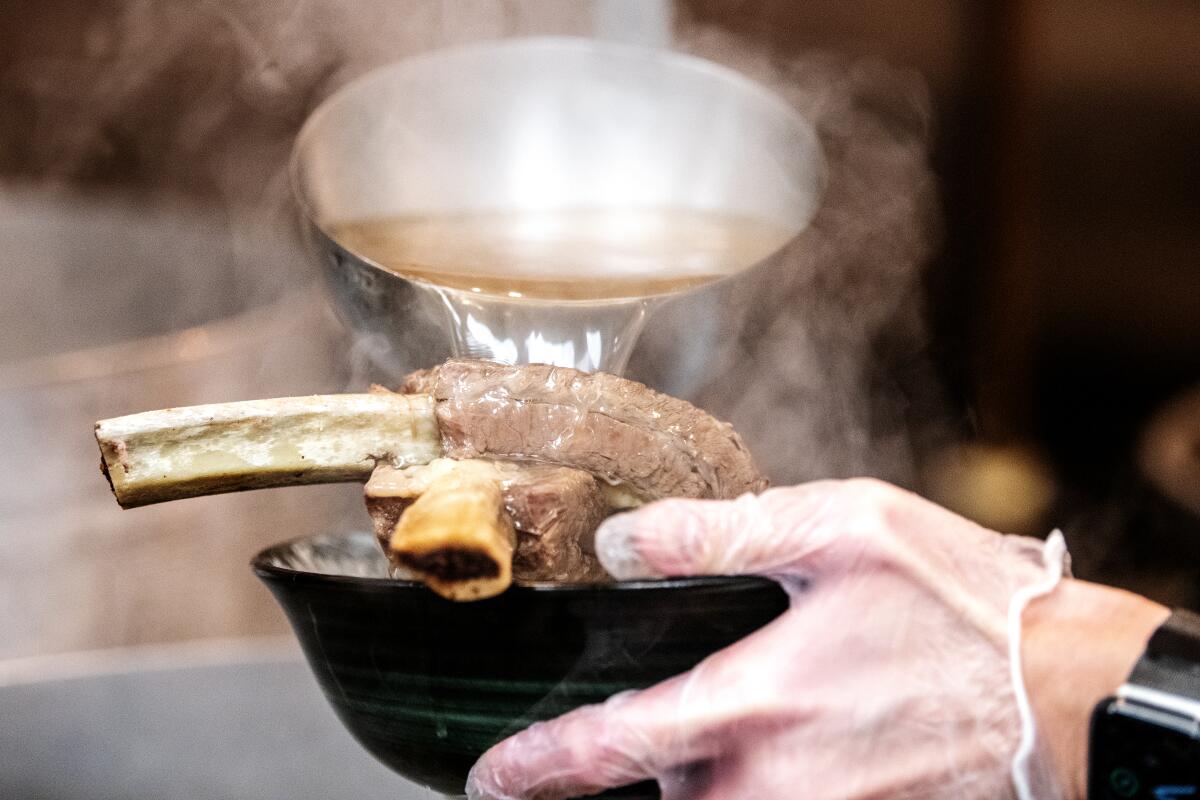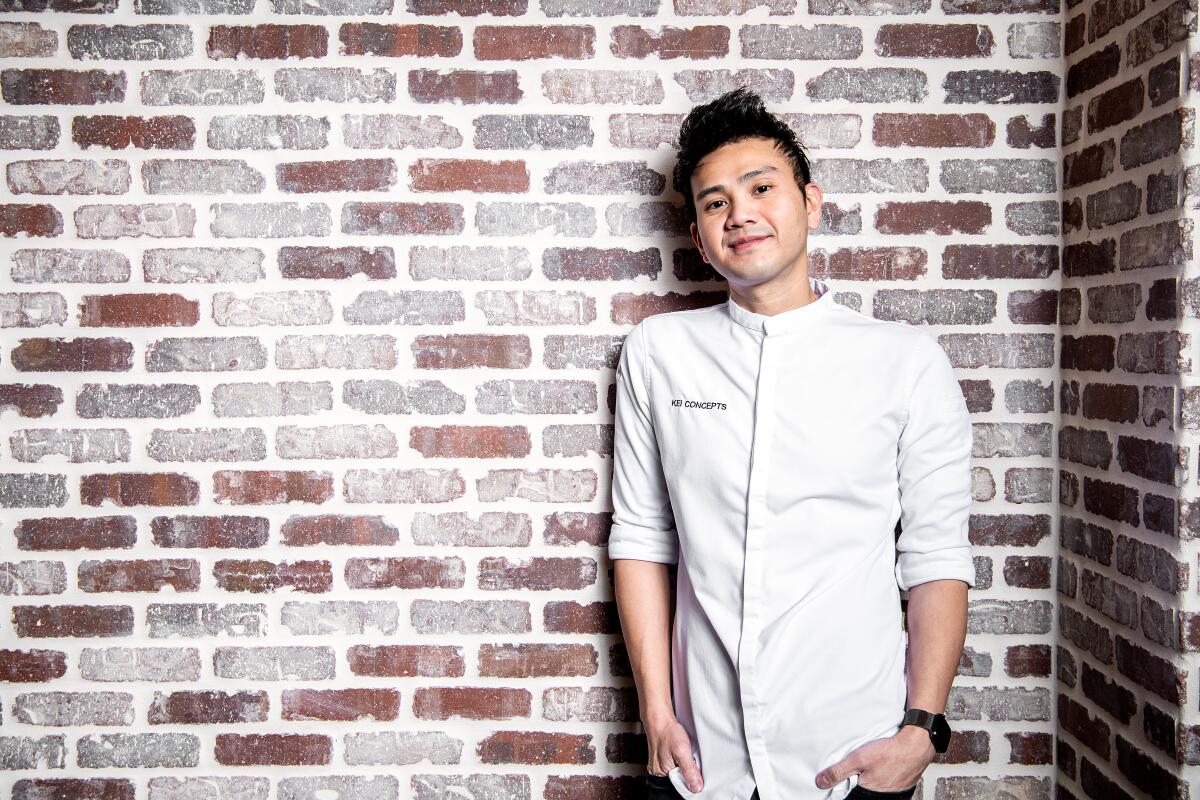Newsletter
Eat your way across L.A.
Get our weekly Tasting Notes newsletter for reviews, news and more.
You may occasionally receive promotional content from the Los Angeles Times.

When Viet Nguyen finally secured the lease for his first restaurant, he wasn’t sure what he’d actually be cooking. The choices came down to ramen or pho, and all he knew for certain was that he wanted to open a noodle bar — the starting point of a road map inspired by David Chang.
“I still was thinking ramen. I was going back and forth. I’m like, ‘I’m trying to be someone I’m not,’” Nguyen recalled. “I know pho. I grew up on it. There’s a story for me to tell.”
Nguyen committed to what he knew, and in 2014, Súp Noodle Bar in Buena Park became the first chapter in a restaurant narrative that he’s continuing to write. He now heads Kei Concepts (named after his daughter), a Huntington Beach-based restaurant group with a roster that also includes the Vox Kitchen and Gem, both in Fountain Valley.
Nguyen’s culinary origin story began in southern Vietnam, where he, his parents and four younger siblings lived in two rooms on the top floor of their family’s busy chemical factory in Ho Chi Minh City. A curious child with a perpetual appetite, Nguyen was drawn to the chaotic symphony of the factory’s kitchen and cafeteria, where 4,000 hungry workers filed in twice a day for meals.
“The coordination between every part of the kitchen, and they only have 30 minutes for lunch — that’s the tricky part,” Nguyen said. “That was insane to me.”
Nguyen watched the kitchen intently. He remembers the arguments he’d overhear but marveled at the teamwork. He was a big kid, and even then, he remembers the rice pots being six times his size. When meal service was over, he’d sometimes slip into the kitchen to fashion leftovers into his own creations.
“I’m so drawn to that. Everyone would be in the front, and I was the only kid — 6, 7 years old — running [around] in the back. I was fascinated by how it all worked,” Nguyen said. “And every day, they’d clean up and start again.”

In 2002, when he was 16, Nguyen moved to the United States alone, settling in with an aunt and uncle in the San Fernando Valley. While he was enrolled at Cleveland High School, he picked up a job at Pho 999, a Vietnamese restaurant in Van Nuys. “I didn’t speak a lot of English back then, so it was easy. My people were there,” Nguyen said.
In 2009, his family purchased Pho Pasteur in Rosemead, where he helped manage the restaurant for a year and a half before heading off to culinary school at Le Cordon Bleu in Pasadena. Nguyen left school before graduating, but he followed his instructor chef Jimmy Wang, currently the culinary director for Panda Express, to work in the kitchen at Wang’s now-closed San Gabriel restaurant, Hot Stuff Cafe.
In 2011, Nguyen stepped out of the kitchen, taking a job with an IT firm that created and managed point-of-sale systems for restaurants. He had always possessed an interest in technology, and the post allowed him to draw from his time watching a busy kitchen operate, from his top-floor perch in Vietnam to his experience working nearly every job in a restaurant.
“I started out by working as a dishwasher, busboy, bartender, barback. You name it. Line cook, prep cook. I know every single position in the restaurant,” he said.
Nguyen worked on an innovative iPad-based point of sale system that made its way onto Gordon Ramsay’s reality television show “Kitchen Nightmares.” The celebrity chef then had the system installed at his L.A. restaurant, the Fat Cow, where Nguyen became an IT technician while also picking up occasional shifts in the kitchen when cooks would call out.
“I got to learn how to run a restaurant. Their director of operation was awesome, so I learned a lot from her,” Nguyen said. “Knowing the point-of-sale system, you know the whole entire restaurant. It’s kind of like the brain of the restaurant.”
::
As he was working through the story he wanted to tell with his first restaurant, Nguyen considered his audience.
Súp Noodle Bar was set to open in the middle of a well-trafficked shopping center on Beach Boulevard in Buena Park, a vibrant thoroughfare dominated by Korean restaurants, markets and businesses; the mall was anchored by crowd-pleasers like H Mart, Daiso and 85°C Bakery Cafe.
There were already two pho restaurants across the street, but after trying them, Nguyen felt confident he could do better.
Nguyen spoke to his landlord and his neighbors to get a better sense of the community and how he could best tailor his restaurant to its tastes. He looked up the best Korean restaurants in Buena Park to figure out what people liked and where he could potentially fit in. They all directed him to Hanyang, a local favorite (and a probable stop for a future What We’re Into episode), popular for its galbi tang, a beef short rib soup.
“I was like, ‘This is genius.’ What if I put this [beef short rib] bone in pho?” said Nguyen, who, immediately after trying Hanyang’s galbi tang, bought some more to take home and later stopped at a market to pick up the same cuts of meat and bone.
Nguyen eventually found a supplier for his short ribs, which serve more than one purpose. Meat from the top of the rib is sliced into thin pieces for Súp’s short rib pho. For rib bone pho, the bone and remaining meat are braised for four hours, giving the meat a texture that’s nearly fall-off-the-bone soft but still grants you the primal satisfaction of shredding meat from bone.
But it all starts with the broth, the linchpin of any good pho.

“We [cook] our broth 48 hours just so we can develop the flavor I grew up eating in Vietnam,” said Nguyen, who despite growing up in the south wanted to make a pho that was more representative of his father’s northern roots. “The flavor is a lot more pungent, strong in cinnamon. There’s only three types of spices in there: cinnamon, cardamom and star anise. Very simple, and there’s a lot of fish sauce in there.”
The initial 24-hour cooking period for Nguyen’s broth begins with beef knuckle and oxtails in a giant kettle. On the second day, hardened pieces of Wagyu fat are cut down and added.
“It takes another 24 hours to develop that fat into the smokiness and creaminess that you will find,” Nguyen said. “You break everything down and you skim it off. The process is time-consuming.”
On the morning the broth is set to be served, the aromatics are added: sautéed onions, ginger and the spices. For his galbi tang-inspired rib bone pho, the braised rib bones also are added to the broth.
“We preserve it in the pho broth, and it has that pho fragrance all throughout and it’s super soft and tender,” Nguyen said. “By braising it a little bit longer, it has more of that pho flavor that we like.”
The rib bone pho has become a permanent fixture on Súp’s varied menu, which also includes lomo saltado and loaded fries. The dish that helped build Nguyen’s first restaurant has carried over into a new Súp location in Irvine, which opened last October.
There was a time, before culinary school, when Nguyen, still earning his stripes in restaurants throughout Los Angeles and Orange counties, had only a couple hundred dollars and two suitcases. He slept in a friend’s closet.

At 34, Nguyen leads a thriving restaurant group. One of his roommates from those lean days would become his business partner. His siblings also joined him in the U.S.
“I know I make a lot of big bets. Some of them don’t pay off, to be honest. There’s so many things that I did that never succeeded,” Nguyen said.
But with Súp, he bet on himself and what he knew best. That seems to have paid off.
“I focused on going back to my roots and [to] show them what pho could be, not what pho is.”
Eat your way across L.A.
Get our weekly Tasting Notes newsletter for reviews, news and more.
You may occasionally receive promotional content from the Los Angeles Times.